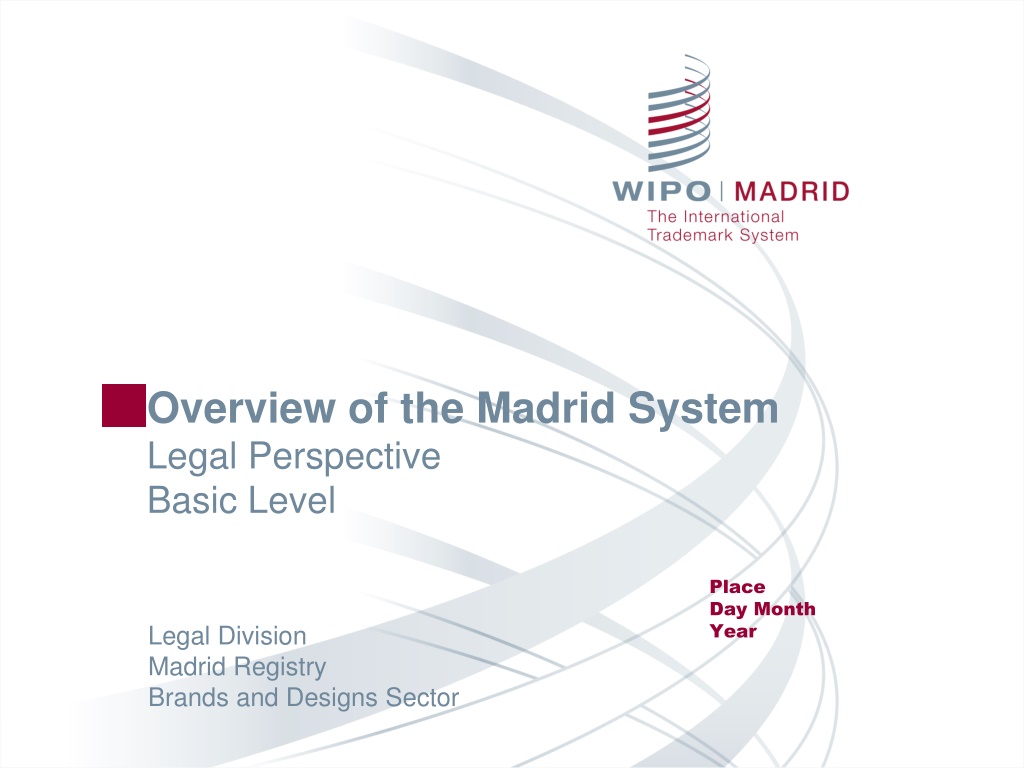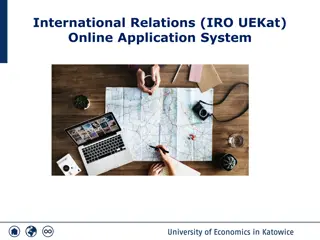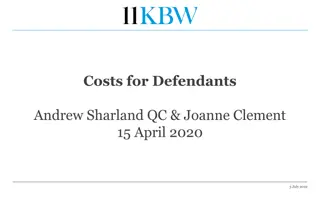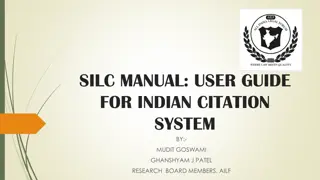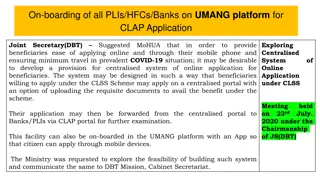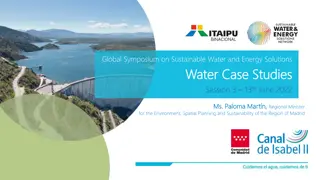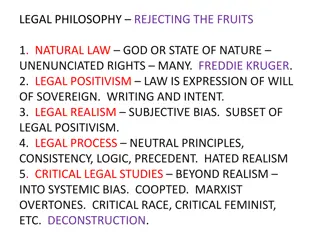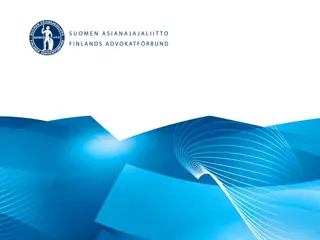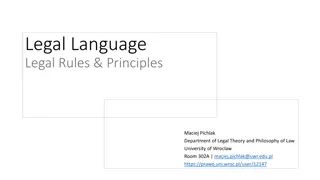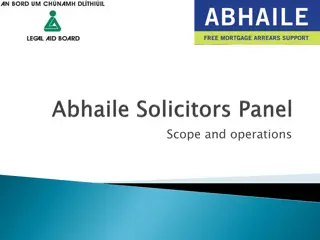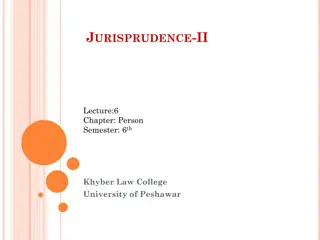Understanding the Madrid System: Legal Aspects and Application Process
Explore the legal perspective and basic levels of the Madrid System, covering international application, examination, effects of registration, provisional refusals, and more. Learn about filing basis, entitlement criteria, and the importance of a basic mark in the application process.
Download Presentation

Please find below an Image/Link to download the presentation.
The content on the website is provided AS IS for your information and personal use only. It may not be sold, licensed, or shared on other websites without obtaining consent from the author. Download presentation by click this link. If you encounter any issues during the download, it is possible that the publisher has removed the file from their server.
E N D
Presentation Transcript
Overview of the Madrid System Legal Perspective Basic Level Place Day Month Year Legal Division Madrid Registry Brands and Designs Sector
Table of Contents International Application Examination of the International Application in the International Bureau Date of the International Registration Effects of the International Registration Examination in the Office of the Designated Contracting Party Communications from the Designated Contracting Party Provisional Refusal Irregular Provisional Refusal Interim Status of a Mark in a Designated Contracting Party Final Disposition on Status of the Mark Invalidation
International Application: 3 Main Actors Applicant Office of origin International Application International Bureau
Filing Basis Under the Madrid System Madrid Agreement and Madrid Protocol Applicant Establishment Domicile Nationality Basic Registration Basic Application
Filing Basis: Entitlement The Madrid system is a closed system The applicant (natural person or legal entity) must be entitled to use the Madrid system through Real and effective industrial or commercial establishment Domicile; or Nationality The Office of the Contracting Party through which the applicant is entitled to use the Madrid system, is considered his Office of origin
Filing Basis: The Basic Mark When the entitlement with a Contracting Party is established, the applicant needs to have a trademark registered or deposited for registration with the Office of that Contracting Party (the basic mark) The international application must concern the same applicant/holder, the same mark and the goods and services in the international application must be covered by the list of goods and services in the basic mark
International Application: Forms 3 international application forms Form MM1: Governed exclusively by the Agreement (Rule 1(viii)) Form MM2: Governed exclusively by the Protocol (Rule 1(ix)) Form MM3: Governed by the Agreement and the Protocol (Rule 1(x)) Official forms available at: http://www.wipo.int/madrid/en/forms/
International Application: Requirements The international application must be presented to the International Bureau via the Office of origin Official form: MM1, MM2 or MM3 Mandatory contents Optional contents Certification by the Office of origin
Mandatory Contents (1) The international application shall contain or indicate Name and address of the applicant Name and address of the representative, if appointed Entitlement of the applicant Any claim of priority, if applicable Reproduction of the mark Indications of the mark (color claim, kind of mark, etc.) Description of the mark, if required
Mandatory Contents (2) Transliteration of the mark, if applicable List of goods and services (Nice Classification) Special requirements requested by some designated Contracting Parties The amount of fees being paid and the method of payment
Optional Contents The international application may also contain Nationality of the applicant / nature of the legal entity Translation of the mark, if possible An indication by words of the principal parts of the mark which are in color, where color is claim Disclaimer
Certification by the Office of Origin The international application shall contain a declaration by the Office of origin certifying The date of receipt of the international application That the applicant is the same as the applicant/holder of the basic mark That the mark is the same as the basic mark; and That the goods and services are covered by the list of goods and services in the basic mark
Special Requirements for Certain Designated Contracting Parties European Union Indication of a second working language Possibility of claiming seniority (MM17) United States of America Declaration of intention to use the mark (MM18) India, Ireland, New Zealand, Singapore, and the United Kingdom The designation is a declaration of intention to use Cuba, Ghana and Japan Individual fees payable in 2 parts
International Application: Fees Basic fee (653 or 903 CHF) plus Standard fee regime Complementary fee(s) per designated Contracting Party (100 CHF), and Supplementary fee(s) per class of goods and services beyond 3 (100 CHF); or Individual fee(s), if the designated Contracting Parties have made such declaration Cuba, Ghana and Japan: individual fees payable in 2 parts Fee calculator available at: www.wipo.int/madrid/en/fees/calculator.jsp
International Application: Presentation The international application must be presented to the International Bureau by the Office of origin through Electronic transmission Postal delivery Fax transmission Where the application is communicated by fax, the original of the reproduction of the mark must follow by mail within a given time limit
Role of the Office of Origin OFFICE OF ORIGIN APPLICATION FORMALITIES IRREGULARITY CERTIFICATION RECEPTION EXAMINATION Providing advice to applicants Certification of the international application Reply to or remedy irregularities Keeping track of basic mark in a 5 year period Notifications of ceasing of effect Forwarding official forms on behalf of the holder
International Application: Procedure National/Regional Application or Registration International Application Designated Contracting Party Publication International Register Office of origin Certification Formalities International Bureau Gazette Applicant Certificate
Examination of the International Application in the International Bureau
Role of the International Bureau The International Bureau examines the formalities such as Information in the international application Classification of goods and services (Nice) Classification of figurative elements (Vienna) Fees The International Bureau will Register the mark in the International Register Notify the Offices of designated Contracting Parties, inform the Office of origin and send a certificate to the holder/representative Publish the mark in the WIPO Gazette of International Marks (e-Gazette)
3 Categories of Irregularities Classification of goods and services (Rule 12) Goods and services not properly classified Office of origin to remedy Indication of goods and services (Rule 13) Too vague, linguistically incorrect, or incomprehensible Office of origin to remedy Miscellaneous (Rule 11) Entitlement, basic registration/application number, priority, MM18, fees, etc. Office or origin, applicant or both to remedy
Irregularity Rule 12: Procedure Proposal from the International Bureau (3-months time limit/ 2 months: reminder) Office of origin s response The International Bureau withdraws (fees paid) = registered as filed The International Bureau modifies or confirms (fees paid) = registered as per modification or International Bureau s proposal No response from the Office of origin Fees paid = registered as per International Bureau s proposal Fees not paid = application abandoned (refund) The International Bureau s opinion prevails Refund: fees paid minus basic fee for a black and white reproduction
Irregularity Rule 13: Procedure Suggestion from the International Bureau (3-month time limit) Office of origin s response Accepted by the International Bureau = Registered as per the Office of origin s opinion Rejected by the International Bureau Registered (term deleted if not classified) Registered as filed (if term is classified, with annotation) No response from the Office of origin Registered as filed, with annotation
Irregularity Rule 11: Procedure Proposal from the International Bureau (3-month time limit) Office of origin s / applicant s response Remedied = registered Not remedied = application abandoned (refund) No response from the Office of origin / applicant = application abandoned (refund) Refund: fees paid minus basic fee for a black and white reproduction
Date of the IR (1) The date of receipt of the international application by the Office of origin, provided it is received by the International Bureau within 2 months The date of receipt by the International Bureau if it is received from the Office of origin later than 2 months The date of the international registration may be affected if any of the following substantive elements is missing (Rule 15): identity of the applicant, designated Contracting Parties, reproduction of the mark, indications of goods and services The date of the international registration will be the date the last missing element was received by the International Bureau
Date of the IR* (2) 2 months * Receipt of the international application by the International Bureau Receipt of the international application by the Office of origin 2 months * Receipt of the international application by the Office of origin Receipt of the international application by the International Bureau 2 months * Receipt by the International Bureau of the last missing element Receipt of the (irregular) international application by the International Bureau Receipt of the international application by the Office of origin
Effects of an International Registration From the date of the international registration, the protection of the mark in each of the designated Contracting Parties is the same as if the mark had been filed directly with the Office of that Contracting Party, and the mark had been registered by the Office of that Contracting Party, if no refusal is notified within the applicable time limit
Examination in the Office of the Designated Contracting Party
The Role of the Office of the Designated Contracting Party The role of the Office of the designated Contracting Party will be determined by the domestic legislation The domestic legislations of the designated Contracting Parties set the conditions for protecting a trademark and determine the rights which result from protection The Madrid system offers the possibility for these Offices to issue decisions on the status of protection Provisional refusals Statements of grant of protection Further decisions Invalidations
Examination Process in the Office of the Designated Contracting Party DESIGNATED OFFICE GRANT OF NATIONAL PROTECTION REGISTRATION RECEIPT OF SUBSTANTIAL NOTIFICATION EXAMINATION PROVISIONAL CONFIRMATION REFUSAL OF REFUSAL The Office of the designated Contracting Party P will examine the request for extension of protection as if it was domestic application Provisional refusals must be notified to the International Bureau within a set time limit The Office of the designated Contracting Party should send a statement of grant of protection to the International Bureau if all procedures before the Office has been completed before the expiry of the time limit and there are no grounds to refuse protection
Communications from the designated Contracting Parties
Communications from designated Contracting Parties Possibility of oppositions filed after 18 months (Rule 16) Interim status (Rule 18bis) Statement of grant of protection (Rule 18ter(1)) Provisional refusal (Rule 17) Statement of grant of protection following a provisional refusal (Rule 18ter(2)) Confirmation of total provisional refusal (Rule 18ter(3)) Further decision (Rule 18ter(4)) Invalidation (Rule 19)
Provisional Refusal Article 5 Rules 16, 17 and 18
Provisional Refusal What is meant by Provisional Refusal ? Are there any restrictions on the right to refuse? Time Grounds Time limits for notification of provisional refusal 12 or 18 months, or 18 months+ The time limit runs from the date of notification from the International Bureau to the Office of the designated Contracting Party in question
Grounds for Provisional Refusal General principle (Article 5(1)) Refusal may be based only on the grounds which would apply, under the Paris Convention, in the case of a mark deposited directly with the Office notifying such refusal Non-valid grounds Divergent opinion on the classification of the goods and services (Rule 12) Banning of multi-class registration or obligation of a limited number of goods or services (Article 5(1))
Notification of Provisional Refusal (1) Notification of provisional refusal is sent to the International Bureau Notification of ex officio provisional refusal must contain The Office making the notification Number of the international registration All the grounds on which the refusal is based If the refusal is based on prior right(s), all relevant data concerning that mark Whether the refusal affects all goods and services or an indication of which goods and services are affected Time limit for filing a request for review/appeal, and to which authority
Notification of Provisional Refusal (2) Where the provisional refusal is based on an opposition, or on opposition and on other grounds, the notification shall indicate that fact In addition to the information in an ex officio provisional refusal, it shall contain Name and address of the opponent Where opposition is based on prior right(s), a list of goods and services on which the opposition is based Provisional refusal is recorded in the International Register and transmitted to the holder
Irregular Provisional Refusal Rule 18
Irregular Provisional Refusal (1) Deficiencies The notification is not signed Details of conflicting mark(s) are not included Goods and services affected are not mentioned Particulars of the opponent and of the goods and services on which opposition is based are not mentioned The provisional refusal is recorded The Office is invited to rectify within 2 months The holder receives a copy of the refusal and of the letter sent to the Office
Irregular Provisional Refusal (2) Deficiencies Time limits are not mentioned (for appeal/to file response to opposition) Competent authority (for appeal) is not mentioned Requirements to file (appeal or response) are not mentioned The provisional refusal is not recorded The Office is invited to rectify within 2 months If rectified, it is recorded with date of defective refusal If not, it is not considered as such The holder receives a copy of the refusal and of the letter sent to the Office
Irregular Provisional Refusal (3) The provisional refusal is not considered as such if it Does not indicate any international registration number Does not indicate any grounds for refusal Is sent after the expiry of the refusal period The International Bureau transmits a copy to the holder for information The International Bureau informs both the holder and the Office
Interim Status of a Mark in a designated Contracting Party Rule 18bis
Interim Status of a Mark in a designated Contracting Party Optional communications from designated Contracting Parties on the status of protection of the mark Interim status before sending a provisional refusal (Rule 18bis(1)(a)) Interim status after sending a provisional refusal (Rule 18bis(1)(b))
Final Disposition on Status of the Mark Rule 18ter
Final Disposition on Status of the Mark Statement of grant of protection where no notification of provisional refusal has been communicated (Rule 18ter(1)) Statement of grant of protection following a provisional refusal (Rule 18ter(2)) Total or partial grant of protection Confirmation of total provisional refusal (Rule 18ter(3)) Further decision (Rule 18ter(4))
Invalidation Rule 19
Invalidation The decision has observed due process The effects of an international registration are invalidated and it is not subject to appeal Content of the decision Specifying the authority International registration number and name of the holder Scope of the invalidation The fact that the decision is not subject to appeal The date the decision was pronounced and, if known, the effective date
